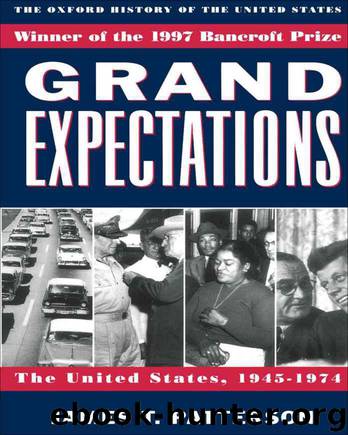Grand Expectations: The United States, 1945-1974 by James T. Patterson

Author:James T. Patterson
Language: eng
Format: mobi, epub
Tags: 20th Century, Retail, Oxford History of the United States, American History, History
ISBN: 9780195117974
Publisher: Oxford University Press, USA
Published: 1997-01-01T15:00:00+00:00
same day, killing the pilot, the American Joint Chiefs of Staff reacted angrily and called for an immediate air strike on Cuba. A majority of Ex-Comm members supported their recommendation. In this terrifying moment it was eyeball-to-eyeball again before Kennedy himself ordered the planes to hold off for at least one more day.
At this point Robert Kennedy, drawing on suggestions from others, offered a way out of the impasse: accept the arrangement proposed in the first Soviet note and act as if the second note had never been received. President Kennedy liked the idea and told Khrushchev that he would accept the first proposal. Again employing open diplomacy, the President made his stance public. In private as well as in public he laid special emphasis on one aspect of the understanding: construction on the sites must stop immediately.36
Kennedy did not inform the public, however, of quiet talks that he also approved. As he was announcing his tough stance to the world, he authorized his brother to talk privately with Anatoly Dobrynin, the Soviet ambassador in Washington. Robert told Dobrynin that Moscow must commit itself by the next day to remove the missiles, in return for which the United States would later take out its missiles from Turkey and from Italy. Kennedy had planned to do so anyway, recognizing that submarine-launched Polaris missiles made the Jupiters obsolete. At the same time, JFK quietly developed a fall-back plan by which the United States, working through the UN, would support removal of its missiles from Turkey in return for Russian removal of its missiles in Cuba.
Khrushchev was so relieved to get the American note that he arose early on the morning of October 28 and personally dictated his acceptance of it. Kennedy was delighted. "I cut his balls off," he crowed privately. But Castro was outraged, both because Khrushchev had given in and because he himself had not been consulted. (He first heard the news over the radio.) Castro kicked a wall, shattered a mirror, and denounced Khrushchev as a "son of a bitch . . . a bastard . . . an asshole," and a man with "no cojones."37
Other interested parties were equally angry at the settlement. When anti-Castro Cuban exiles in Florida heard of it, they were irate that Kennedy would consider a promise not to invade the island. Kennedy, they said, had agreed to "another Bay of Pigs for us. . . . We are just like the Hungarians now." Later that day, when Kennedy met with American military leaders to thank them for their advice, he was staggered by their reaction. "We have been had," one said. SAC chief Curtis LeMay pounded the table. "It's the greatest defeat in our history, Mr. President. . . . We should invade today." McNamara, who was present, recalled that Kennedy "was absolutely shocked. He was stuttering in reply."38
At that stage, however, there was little that opponents of the settlement could do: Kennedy and Khrushchev had spoken. Within the next few weeks the two leaders saw to it that most of the agreement went into effect.
Download
Grand Expectations: The United States, 1945-1974 by James T. Patterson.epub
This site does not store any files on its server. We only index and link to content provided by other sites. Please contact the content providers to delete copyright contents if any and email us, we'll remove relevant links or contents immediately.
| Canada | Caribbean & West Indies |
| Central America | Greenland |
| Mexico | Native American |
| South America | United States |
Cat's cradle by Kurt Vonnegut(13894)
Pimp by Iceberg Slim(12946)
Underground: A Human History of the Worlds Beneath Our Feet by Will Hunt(11264)
4 3 2 1: A Novel by Paul Auster(11074)
The Radium Girls by Kate Moore(10915)
American History Stories, Volume III (Yesterday's Classics) by Pratt Mara L(4828)
Perfect Rhythm by Jae(4628)
Wiseguy by Nicholas Pileggi(4600)
The Fire Next Time by James Baldwin(4350)
Paper Towns by Green John(4177)
A Higher Loyalty: Truth, Lies, and Leadership by James Comey(4038)
Pale Blue Dot by Carl Sagan(4016)
The Mayflower and the Pilgrims' New World by Nathaniel Philbrick(3918)
The Doomsday Machine by Daniel Ellsberg(3736)
Too Much and Not the Mood by Durga Chew-Bose(3699)
Killers of the Flower Moon: The Osage Murders and the Birth of the FBI by David Grann(3622)
The Borden Murders by Sarah Miller(3594)
The Sympathizer by Viet Thanh Nguyen(3515)
Killing England by Bill O'Reilly(3461)
